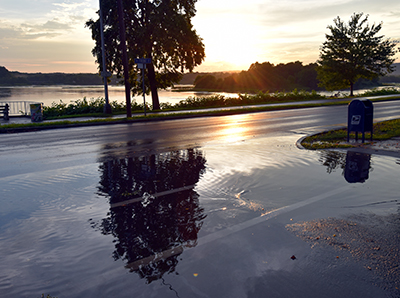HOW TO BE STORMWATER SMART
WHY IS STORMWATER A PROBLEM?
 In 2016, DEP labeled approximately 19,000 miles of rivers and streams in Pennsylvania impaired for water supply, aquatic life, recreation, or fish consumption. Stormwater runoff pollution is one of the biggest reasons for this impairment.
In 2016, DEP labeled approximately 19,000 miles of rivers and streams in Pennsylvania impaired for water supply, aquatic life, recreation, or fish consumption. Stormwater runoff pollution is one of the biggest reasons for this impairment.
Over the past 100 years, streets, parking lots, sidewalks, and roofs have been a steadily increasing part of our communities as we’ve developed more and more of the landscape. As a result, rain that would otherwise soak into the ground instead rushes over these nonporous surfaces and into storm drains, which send it directly into rivers and streams.
Stormwater carries an enormous amount of pollution, including sediment, car oil, lawn fertilizers, pesticides, pet poop (and viruses and bacteria), and cigarette butts. As you might expect, this has many negative impacts on streams and rivers.
- Rivers are the source of our drinking water supply; when rivers aren’t healthy, public health risks increase.
- Sediment harms aquatic life when it smothers macroinvertebrates and clogs spaces between rocks, destroying essential habitat for many species.
- Fertilizers stimulate excessive algae growth, causing algal blooms that remove oxygen from the water. Fish and other aquatic organisms can’t exist in water with low dissolved oxygen levels.
- Bacteria and other pathogens can wash into swimming areas and create health hazards, making beach closures necessary.
- Debris—such as plastic bags, six-pack rings, and cigarette butts—washed into rivers can choke, suffocate, or disable ducks, fish, turtles, and birds.
- Household hazardous wastes like insecticides, pesticides, paint, solvents, and motor oil can poison aquatic life.
- Land animals and people can become sick or die from eating diseased fish and shellfish or ingesting polluted water.
- Because groundwater levels don’t get fully replenished, springs and wells can go dry.
More Resources
- Things You Can Do To Prevent Stormwater Pollution
- How to be Stormwater Smart
- Homeowners Guide to Stormwater BMP Maintenance
- Storm Water Activity Book